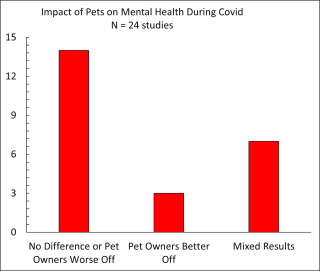Animal Behavior
What You Didn't Know About Having a Pandemic Pet
New studies question the impact of pets on mental health during lockdowns.
Posted May 27, 2022 Reviewed by Tyler Woods
Key points
- Surveys show that most pet owners are convinced that living with companion animals improves their mental health and psychological well-being.
- However, many research reports have found that the mental health of pet owners is not measurably better than that of people without a pet.
- The isolation and stress associated with COVID lockdowns afforded investigators an opportunity to test this "pet effect paradox."
- Contrary to conventional wisdom, a large majority of studies found pets have little or no impact on human mental heath during pandemics.

(Note - this post was updated March 18, 2023)
According to some estimates, 23 million American households acquired a cat or dog during the first year of the pandemic. One of the lucky pups was Moose, a golden doodle my daughter Katie and her wife Janna adopted. When I asked Katie if her pet had improved their lives during COVID, she said, “Definitely. He’s my little buddy, my best friend. I love Moose so much I find it hard to imagine life without him.”
Katie is not alone. Nearly every pet owner I know believes our companion animals have a positive influence on our psychological well-being. I’m certainly convinced that my late cat Tilly helped me cope with the stress of writing a book on human-animal interactions. The pet industry refers to the idea that living with a companion animal causes improvements in human physical and mental health as “the pet effect.” A 2021 survey by the Human Animal Bond Research Institute (HABRI) found that 87 percent of pet owners reported they had personally experienced the mental health benefits of pet ownership.
But here is the problem—the bulk of published studies have reported that pet owners are not psychologically better off than non-owners. While even my friends and family say they don’t believe me, most studies have found that people who live with pets are not less depressed, less lonely, or happier than people who don’t live with companion animals. (See, for example, here, here, and here.)
The Pet Effect Paradox
The pet effect paradox is the mismatch between the personal experiences of pet lovers (including myself) that our pets improve our psychological well-being and the decidedly mixed results of actual research. What about the impact of pets during COVID lockdowns? News reports like “How Pets Are Protecting Mental Health During Quarantine” tout the idea that getting a pet will help you cope with the dark days of the pandemic. But are these claims true? Fortunately, COVID-19 offered researchers a unique opportunity to examine the extent pets buffer the stress and isolation associated with the pandemic.
I recently reviewed published research reports in which investigators compared the mental health of pet owners and non-owners since the first COVID lockdowns in the spring of 2020. As a long-time pet lover, I was surprised by what I found.
The COVID Studies On Pets and Mental Health
I found 24 empirical studies that examined the impact of pets on psychological wellness during the time of COVID. To be included on my list of studies, the research had to have been published in English in peer-reviewed journals. The studies also had to compare quantitative measures of aspects of the mental health of pet owners and non-owners, including statistical analyses--for example, depression, anxiety, stress, loneliness, and psychological well-being. (I did not include research that was based only on qualitative interviews or studies that did not compare the mental health of pet owners and non-owners.) The 24 studies were published between spring 2021 and March 18, 2023, and involved over 25,000 subjects. They were conducted by research teams from the United States, the United Kingdom, Canada, Australia, New Zealand, Malaysia, Portugal, Singapore, Pakistan, and China.
Most studies found no (or negative) effects of pets on well-being.
Most of the studies found little or no evidence that living with a pet improved the mental health of their owners. Indeed, several of these reported that pet owners were worse off than non-owners.

Here are samples of typical findings.
- University of Quebec researchers found that “Canadian pet owners reported lower vitality, lower life satisfaction, lower presence of life meaning, and higher loneliness compared to non-pet owners. Pet owners were also found to experience higher COVID-related impacts compared to non-pet owners.”
- Researchers at Queens University in Northern Ireland reported, “no significant relationship between companion animal ownership and any of the mental health outcome measures.”
- Heather Clements of the University of West Scotland and her colleagues found that “Companion animal guardianship alone was not linked to loneliness or well-being during the pandemic, but there was evidence that people who interact more with dogs…were lonelier and had poorer well-being.”
- Investigators from the University of Montreal reported, “Our results suggest that there was no association between pet ownership and the mental health and well-being indicators measured in the present study.”
- A research team headed by Tufts University psychologist Megan Mueller on the impact of pets on anxiety in adolescents during COVID found, “Contrary to our hypotheses, the results did not support a buffering effect of pet ownership on loneliness….Pet ownership predicted an increase in loneliness from pre-pandemic to during the pandemic.”
- A research group from Australia examined measures of the quality of life of pet owners during lockdowns. They reported, ”These current findings suggest that having a cat or dog was associated with reduced life satisfaction, perhaps resulting from increased pressures in a lockdown situation.”
Studies reporting mixed results.
- A Portuguese study found that owning a dog was associated with reduced depression in rural areas. However, urban dog owners were more depressed than city dwellers without a dog.
- New Zealand researchers concluded, “Pet ownership was associated with lower depression and anxiety.” Pet-keeping, however, did not alleviate loneliness.
- Malaysian researchers found that pet owners experienced more “positive emotions” during a lockdown, but that pet owning had no effect on depression, stress, anxiety, or negative emotions.
- A Nestle Purina research team found dog owners were less depressed than non-owners. But while the difference in depression scores was “statistically significant,” the size of the pet effect on depression was very small (for stat nerds, d = .07.) There were no differences between dog owners and non-owners in measures of anxiety or happiness.
- In a U.K. study, pet owners scored slightly higher on mental health measures, but the researchers noted that the differences between owners and non-owners were small and “did not support the idea that a companion animal, in general, strongly protects against worsened mental health and increased loneliness in a pandemic context.”
Only three studies found overall positive effects of pets on mental health.
- For example, investigators from Singapore used standardized measures to assess the physical and mental health of 431 pet owners and 103 non-pet owners. They found that pet owners had higher scores on emotional well-being, energy, and social functioning. The researchers concluded, that “during a period of lockdown, pet-owning served as a positive factor against detrimental psychological effects of a pandemic.”
A Mystery in the Study of Human-Animal Relationships
The pattern of the results of this body of research is remarkable. Only three of the 24 studies conducted on the benefits of pet ownership during the pandemic found strong evidence for a relationship between pet ownership, mental health, and psychological well-being. Seven studies produced mixed results. For example, one study found that dog owners in rural areas had better mental health than non-owners, but the opposite was true of dog owners living in cities. Pet owners in the other `14 studies were not better off psychologically than non-pet owners. In some cases, pet owners had significantly more mental health issues than people without companion animals.
The results of these studies on the impact of pets on mental health during the pandemic provide convincing evidence for the "pet effect paradox." To me, this is the biggest mystery in the new science of human-animal relationships. What accounts for the mismatch between our personal experience with the benefits of loving animals and the large body of empirical findings that pet-keeping, in and of itself, has little or no positive impact on human mental or physical health?
I don’t have an answer. Neither does Tufts University's Megan Mueller. She tells me she thinks about it all the time. So do I.
References
Studies reporting null or negative differences in the mental health of pet owners and non-owners.
Albright, A. E., Cui, R., & Allen, R. S. (2022). Pet ownership and mental and physical health in older White and Black males and females. International journal of environmental research and public health, 19(9), 5655. https://www.mdpi.com/1660-4601/19/9/5655
Amiot, C. E., Gagné, C., & Bastian, B. (2022). Pet ownership and psychological well-being during the COVID-19 pandemic. Scientific Reports, 12(1), 6091. https://doi.org/10.1038/s41598-022-10019-z
Clements, H., Valentin, S., Jenkins, N., Rankin, J., Gee, N. R., Snellgrove, D., & Sloman, K. A. (2021). Companion Animal Type and Level of Engagement Matter: A Mixed-Methods Study Examining Links between Companion Animal Guardianship, Loneliness and Well-Being during the COVID-19 Pandemic. Animals, 11(8), 2349. https://doi.org/10.3390/ani11082349
Denis-Robichaud, J., Aenishaenslin, C., Richard, L., Desmarchelier, M., & Carabin, H. (2022). Association between Pet Ownership and Mental Health and Well-Being of Canadians Assessed in a Cross-Sectional Study during the COVID-19 Pandemic. International Journal of Environmental Research and Public Health, 19(4), 2215. https://doi.org/10.3390/ijerph19042215
Falck, R. S., Liu-Ambrose, T., Noseworthy, M., Kirkland, S., Griffith, L. E., Basta, N. E., ... & Raina, P. (2022). Can “Rover” help with mental health during the COVID-19 pandemic? Results from the Canadian Longitudinal Study on Aging (CLSA). Frontiers in Psychiatry, 2234. https://www.frontiersin.org/articles/10.3389/fpsyt.2022.961067/full?&utm_source=Email_to_authors_&utm_medium=Email&utm_content=T1_11.5e1_author&utm_campaign=Email_publication&field=&journalName=Frontiers_in_Psychiatry&id=961067
Krouzecky, C., Aden, J., Hametner, K., Klaps, A., Kovacovsky, Z., & Stetina, B. U. (2022). Fantastic Beasts and Why It Is Necessary to Understand Our Relationship—Animal Companionship under Challenging Circumstances Using the Example of Long-Covid. Animals, 12(15), 1892. https://www.mdpi.com/2076-2615/12/15/1892
Kuehne, J., Lieu, J., Kotera, Y., & Taylor, E. (2022). Pets’ impact on people's well-being in COVID-19: A quantitative study. Journal of Concurrent Disorders. https://www.researchgate.net/profile/Yasuhiro-Kotera/publication/363663357_Pets'_impact_on_peoples_well-being_in_COVID-19_A_quantitative_study/links/6328d67d071ea12e364684ff/Pets-impact-on-people-s-well-being-in-COVID-19-A-quantitative-study.pdf
Law, M., Gasteiger, N., Vedhara, K., Massey, A., Jia, R., Ayling, K., ... & Broadbent, E. (2022). Risk Factors and Changes in Depression and Anxiety over Time in New Zealand during COVID-19: A Longitudinal Cohort Study. Psych, 4(4), 706-716.https://www.mdpi.com/2624-8611/4/4/52
McDonald, S. E., O’Connor, K. E., Matijczak, A., Tomlinson, C. A., Applebaum, J. W., Murphy, J. L., & Zsembik, B. A. (2021). Attachment to Pets Moderates Transitions in Latent Patterns of Mental Health Following the Onset of the COVID-19 Pandemic: Results of a Survey of U.S. Adults. Animals, 11(3), 895. https://doi.org/10.3390/ani11030895
Mueller, M. K., King, E. K., Halbreich, E. D., & Callina, K. S. (2022). Companion Animals and Adolescent Stress and Adaptive Coping During the COVID-19 Pandemic. Anthrozoös, 0(0), 1–20. https://doi.org/10.1080/08927936.2022.2027093
Mueller, M. K., Richer, A. M., Callina, K. S., & Charmaraman, L. (2021). Companion Animal Relationships and Adolescent Loneliness during COVID-19. Animals, 11(3), 885. https://doi.org/10.3390/ani11030885
Phillipou, A., Tan, E., Toh, W., Van Rheenen, T., Meyer, D., Neill, E., Sumner, P., & Rossell, S. (2021). Pet ownership and mental health during COVID-19 lockdown. Australian Veterinary Journal, 99(10), 423–426. https://doi.org/10.1111/avj.13102
Shah, S. M. A., Mohammad, D., Qureshi, M. F. H., Abbas, M. Z., & Aleem, S. (2021). Prevalence, Psychological Responses and Associated Correlates of Depression, Anxiety and Stress in a Global Population, During the Coronavirus Disease (COVID-19) Pandemic. Community Mental Health Journal, 57(1), 101–110. https://doi.org/10.1007/s10597-020-00728-y
Wells, D. L., Clements, M. A., Elliott, L. J., Meehan, E. S., Montgomery, C. J., & Williams, G. A. (2022). Quality of the Human–Animal Bond and Mental Wellbeing During a COVID-19 Lockdown. Anthrozoös, 0(0), 1–20. https://doi.org/10.1080/08927936.2022.2051935
Studies finding mixed results on the impact of pets on mental health:
Bennett, B., Cosh, S., Thepsourinthone, J., & Lykins, A. (2022). A mixed-methods assessment of human well-being related to the presence of companion animals during the COVID-19 pandemic. People and Animals: The International Journal of Research and Practice, 5(1), 5. https://docs.lib.purdue.edu/paij/vol5/iss1/5/
Grajfoner, D., Ke, G. N., & Wong, R. M. M. (2021). The Effect of Pets on Human Mental Health and Wellbeing during COVID-19 Lockdown in Malaysia. Animals, 11(9), 2689. https://doi.org/10.3390/ani11092689
Lima, M., Mateus, T. L., & Silva, K. (2022). With or Without You: Beneficial and Detrimental Associations Between Companion Dogs and Human Psychological Adjustment During a COVID-19 Lockdown Phase. Anthrozoös, 0(0), 1–20. https://www.tandfonline.com/doi/abs/10.1080/08927936.2022.2042081
Martin, F., Bachert, K. E., Snow, L., Tu, H.-W., Belahbib, J., & Lyn, S. A. (2021). Depression, anxiety, and happiness in dog owners and potential dog owners during the COVID-19 pandemic in the United States. PLOS ONE, 16(12), e0260676. https://doi.org/10.1371/journal.pone.0260676
Martinez-Caja, A. M., De Herdt, V., Enders-Slegers, M. J., & Moons, C. P. H. (2022). Pet ownership, feelings of loneliness, and mood in people affected by the first COVID-19 lockdown. Journal of Veterinary Behavior, 57, 52-63. https://www.sciencedirect.com/science/article/pii/S155878782200106X?casa_token=F9jZHci-vVgAAAAA:KyyhRc6jPCs2NV_v2L9PTayehyT6YNPMEUJHOhMaJvUQNmg1vRBoCzLZqwU2sI3IXe3RD4BvA_U
Ratschen, E., Shoesmith, E., Shahab, L., Silva, K., Kale, D., Toner, P., Reeve, C., & Mills, D. S. (2020). Human-animal relationships and interactions during the Covid-19 lockdown phase in the UK: Investigating links with mental health and loneliness. PLOS ONE, 15(9), e0239397. https://doi.org/10.1371/journal.pone.0239397
Xin, X., Cheng, L., Li, S., Feng, L., Xin, Y., & Wang, S. (2021). Improvement to the subjective well‐being of pet ownership may have positive psychological influence during COVID‐19 epidemic. Animal Science Journal = Nihon Chikusan Gakkaiho, 92(1), e13624. https://doi.org/10.1111/asj.13624
Studies finding pet owners generally had better mental health than non-owners:
Gasteiger, N., Vedhara, K., Massey, A., Jia, R., Ayling, K., Chalder, T., Coupland, C., & Broadbent, E. (2021). Depression, anxiety and stress during the COVID-19 pandemic: Results from a New Zealand cohort study on mental well-being. BMJ Open, 11(5), e045325. https://doi.org/10.1136/bmjopen-2020-045325
Giansanti, D., Siotto, M., Parisi, L., & Aprile, I. (2022). Pet presence can reduce anxiety in the elderly: The Italian experience during COVID-19 lockdown assessed by an electronic survey. International Journal of Environmental Research and Public Health, 19(10), 6135. https://www.mdpi.com/journal/ijerph
Tan, J. S. Q., Fung, W., Tan, B. S. W., Low, J. Y., Syn, N. L., Goh, Y. X., & Pang, J. (2021). Association between pet ownership and physical activity and mental health during the COVID-19 “circuit breaker” in Singapore. One Health, 13, 100343. https://doi.org/10.1016/j.onehlt.2021.100343




